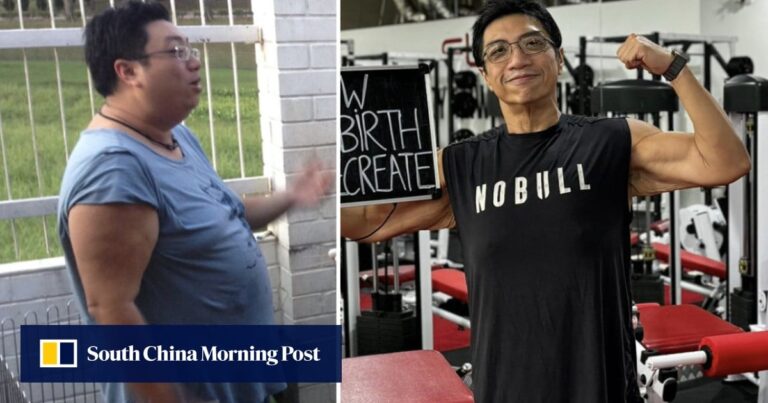[ad_1]
“I still remember the shock I felt when I heard those words,” Tan says.

Over the following three years, from April 2021 to June 2024, Tan managed to lose more than 40kg, dropping from 120kg to 78kg. His body fat percentage went from 40 to 21.7.

A year and a half into his weight-loss journey, Tan’s health had improved dramatically. He stopped taking medication to lower his blood pressure, the dosage for his diabetes medicine was cut by more than half and that for his gout medication to a third of the level previously.
The acid reflux, sleep apnoea, frozen shoulder and knee pain all disappeared.
To change one’s physical appearance, it has to first happen in the mind and then with consistent effort it manifests in real life
“My doctors asked me to write a book on my fitness journey so that they could gift copies to other patients with the same ailments,” says Tan, who now has annual check-ups rather than monthly doctor visits.

“Exercising was new to Alex,” Lee says. “He carried excess body weight and had limited mobility in his hips, ankles, knees, and shoulders.
“Initially the goal was to lose weight, get him away from a sedentary lifestyle, and build his stamina without putting too much pressure on his joints.”
Lee’s focus was to help her client develop full-body strength and endurance while targeting the quads, glutes, hamstrings, chest and shoulders, she says.
The time you don’t feel like going to the gym is the time you must go
Tan did exercises such as dumbbell chest press, seated rows, leg press, sled push and sled backward pull while wearing weight belts.
“Weight-loss transformation is all about the mind. It is about rebuilding one’s belief system,” Lee says.
“To change one’s physical appearance, it has to first happen in the mind and then with consistent effort it manifests in real life. It is a journey where individuals have to change their lifestyle, practise self-discipline and self-love,” she adds.

Tan found the exercises extremely taxing at first. “I felt as though my heart would burst,” he says.
The calorie-deficit diet Lee put Tan on “meant no starchy carbohydrate foods, a focus on consuming vegetables and fruits and lean meat, mainly chicken”, Lee says.

She has adjusted his meal plan several times and introduced starchy carbohydrates into his diet based on his weight-loss progress.
“I tried home prepping my meals for the week, signed on for a meal-delivery service, but none worked. Only when I changed my focus [to] what I could eat as opposed to what I could not eat was I able to stick to a healthy routine,” he says.

Tan now eats the same foods every day.
“I love food and when there’s a variety of foods to choose from, I tend to crave and eat more. So I plan what I eat.”
One year into his training, Tan had lost 15kg. Around that time, he met Rachel, his current partner, who is in the education industry and teaches Zumba and K-pop fitness dance as a hobby.
Being able to walk into a store and buy clothes which I could not have fit into earlier is incredible
Soon, Rachel joined Tan’s gym and they began training together. “She understood my new lifestyle. We were on this journey together and suddenly it did not seem that hard.”
The best part is that she loves desserts, and bakes low-calorie cakes that Tan enjoys.
Tan’s advice to anyone who wants to lose weight is that the best time to begin your fitness journey is now. He has an album of photos titled “Fat” on his phone, with photos of himself when he was obese.
“I show it to people and tell them, ‘If I can do it, so can you.’”

Tan’s number-one tip is to not deprive yourself, but to save some of your calorie quota for what you love to eat.
“The time you don’t feel like going to the gym is the time you must go,” he says, adding there is no quick fix to becoming fit.
“One’s mentality needs to change and only then does the lifestyle change. Following a process and building micro habits are the key to sustainable weight loss.”
Tan is grateful for his transformation and enjoys his new-found energy.
“I have people walking up to me whom I don’t know very well, who’ve seen me before, and they say, ‘What did you do? You inspire us,’” he says.
“The feeling of being able to walk into a store and buy clothes which I could not have fit into earlier is incredible. It feels even more amazing when I don’t need to buy the biggest size they have.

“I could have been dead. I wouldn’t be able to go on the long walks that I do now with my partner. My son is going to [do his Singaporean] national service soon. I am training him to prepare him both physically and mentally. I wouldn’t have been able to do that earlier,” Tan says.
He concludes with his favourite quote, from the late aerospace scientist and former Indian president A.P.J. Abdul Kalam: “You cannot change your future, but you can change your habits, and surely your habits will change your future.”
[ad_2]
This article was originally published by a www.scmp.com . Read the Original article here. .


